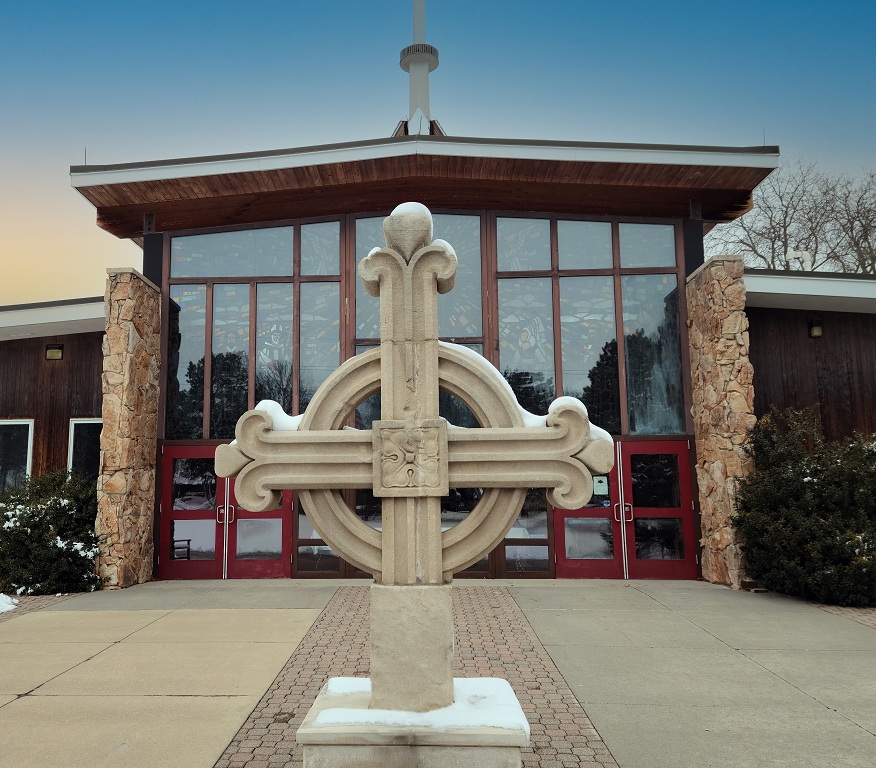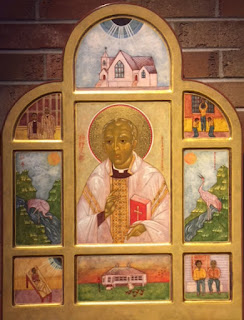Fake News, Social Media, and Christian Witness
You might think this is a strange post for a priest to write, but I think it is very important in this time of so much vitriolic rhetoric that Christians make a strong stand. The Book of James in the Bible has quite a lot to say about the power of our speech and the need for taming the tongue:
If someone thinks he is religious yet does not bridle his tongue, and so deceives his heart, his religion is futile (1:26).
The tongue is a small part of the body, yet it has great pretensions. Think how small a flame sets a huge forest ablaze. And the tongue is a fire! The tongue represents the world of wrongdoing among the parts of our bodies. It pollutes the entire body and sets fire to the course of human existence – and is set on fire by hell...It is a restless evil, full of deadly poison. With it we bless the Lord and Father, and with it we curse people made in God’s image. From the same mouth come blessing and cursing. These things should not be so, my brothers and sisters (3:5-6, 8b-10).
But the wisdom from above is first pure, then peaceable, gentle, accommodating, full of mercy and good fruit, impartial, and not hypocritical. And the fruit that consists of righteousness is planted in peace among those who make peace (3:17-18).
Since January, researchers at the Carnegie Mellon School of Computer Science have collected more than 200 million tweets discussing coronavirus or COVID-19. Of the top 50 influential retweeters, 82% are bots, they found. Of the top 1,000 retweeters, 62% are bots. It's pretty safe to assume the same rough percentages are true on Facebook as well. Since most of you reading this will be Facebook users, I will focus on that.
The purpose of these bots (attacks, really) are to sow discord, distrust, and anger. There will be even more of them as our November election draws closer.
My point is not that we should stop expressing our opinions, but that we need to take heed of James' exhortations to remember that speech is a mighty tool that can build up but also can tear apart. Sharing your opinion is one thing; sharing something that is claiming to be true or actual news reporting but is not, is another. We all need to be extra cautious, and not give even more fuel to the propagation of "fake news."
Here are some suggestions for Facebook users.
I don't share a post from someone else without pausing to see the source. Many posts that are shared are originally made to appear as if from a real source, but are not. I don't share images/text that are not linked to a good news source.
How can you tell?
On Facebook, if a news/article post does not have a little "i" information link on the article (see image above), I don't share.
If the post does have a little "i" information link, I click it and check out the details. In this example below, you can see that The Dallas Morning News is a print newspaper of long-standing tenure and that the Facebook page has been registered for more than 10 years:
Here below is an example for a news source someone shared that I was not sure of. When I clicked on the information icon, the lack of any details made me feel very uncomfortable sharing this as factual news.
If I still think I might want to share a post like this, I will check for the news source on the Media Bias Chart website here https://www.adfontesmedia.com/intro-to-the-media-bias-chart. (This site is transparent on the way they rank articles and sites, and it has a 4-minute overview video of their methodology, and a one-hour detailed video explaining it.)
This site continuously ranks all major news sites for left/right bias and for fact/opinion/reliability. The chart looks like this (use the link above for real chart):
The news sources are put into four groups:
- Most Reliable for News (green dotted-line box at the top center)
- Reliable for News But High in Analysis/Opinion
- Some Reliability Issues and/or Extremism
- Serious Reliability Issues and/or Extremism
If the news source I have a question on is not listed by the Media Bias website, then I don't share it as news. If it is not in the green box at the top center (most reliable and least biased), then I don't share it as news.
If I'm sharing photos or memes that are opinion, and not news, I try to check on where the post originally came from (that is, a friend shared it, but where did it come from first?) With potentially more than half of all political posts being created by bots to sow enmity, I want to make sure I'm not contributing to the problem. There are several clues that the originator might be a bot:
- The original poster's profile has no details and has never had "real" profile photos. Real people typically change their profile photo.
- There are no posts on the person's timeline other than political-type posts. Real people post other things as well, and post photos of events, family, and friends.
- There are no posts by friends on the originator's timeline.
- The profile has only recently been created.
Another good site to use to check the truthfulness of a post is Snopes.com. This fact-checking site has been in existence since 1994, and is also transparent in its analysis process. I find Snopes to be very good for tracking claims/rumors/facts that surface and immediately get wide re-posting.
Finally, I believe our Christian mandate is to not make ad hominem attacks against someone, no matter how strong our opinion is. (An ad hominem argument or reaction is one directed against a person rather than the position they are maintaining.) Jesus commands us to pray for our enemies, and we have vowed at our baptism to respect the dignity of every human being--even those we think are wrong. The reality is we will never convince anyone to change their minds by attacking someone's intelligence or motivation--our only chance is to replace the echo chamber of shouting and disrespect with mutual listening and respect, leading the way to a return to community standards of discourse, facts, and truthfulness.
There is certainly much to be concerned about in our lives today, and there is great cause for action to regain our balance and our sense of community and common purpose, and there is great need for justice for all, dignity for all, and opportunity for all. As Christians, we are given the ministry of reconciliation in the world and charged with being light in the darkness: a good place to start that witness is by taming our own speech, and perhaps in the process making it more effective.
Yours in Christ,
Keith+
Fr. Keith Winton
Assistant Rector, All Saints Episcopal Church
9302 Blondo St • Omaha • NE • 68134
@allsaintsoma • https://www.allsaintsomaha.org









Comments
Post a Comment